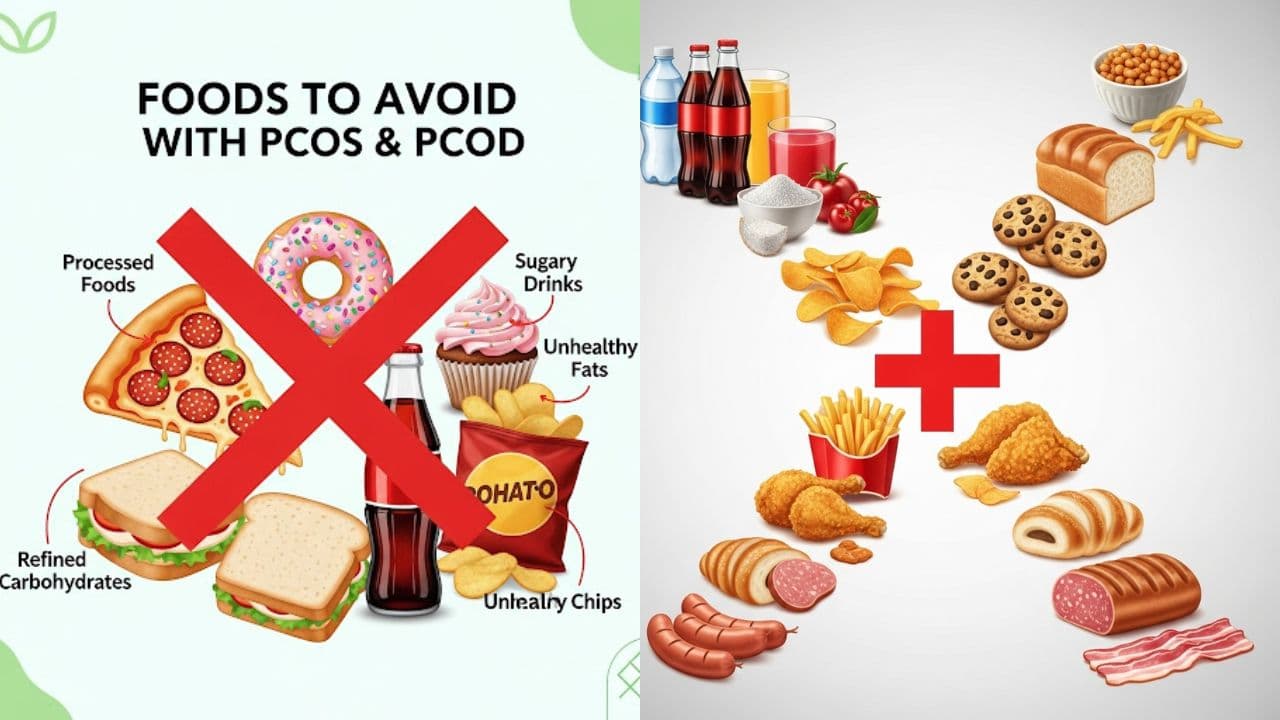Polycystic Ovarian Syndrome (PCOS) affects many women and is linked to hormonal imbalance, insulin resistance, and weight gain. Dietary changes and lifestyle habits play a key role in managing symptoms and improving overall health.
Polycystic Ovarian Syndrome (PCOS) is one of the most common endocrine and metabolic disorders affecting women of reproductive age. It is typified by irregular menstrual cycles, hyperandrogenism (excess male hormones), and polycystic ovaries. Insulin resistance and obesity are the major contributors; lifestyle modifications and dietary changes are an effective primary approach in their management. A regulated, fact-based diet can help improve metabolic health, restore ovulation, and reduce long-term risks such as type 2 diabetes and cardiovascular disease.
Dietary and lifestyle changes that can help to fight PCOS are
1. Calorie Control and Weight Management
2. Low Glycemic Index (GI) Diet
A diet that helps to reduce blood sugar is important, since insulin resistance is a key factor in PCOS. Low to moderate GI foods such as whole grains, legumes, and non-starchy vegetables are desirable, and most fruits release glucose slowly into the bloodstream. This helps to reduce the body’s insulin needs and restore hormonal balance. Opt for whole grain varieties like brown rice, oats, quinoa, and millets instead of refined carbohydrates
3. Balanced nutrients
Carbohydrates: Should make up about 40–45% of daily calories, with importance on complex carbohydrates and high-fiber foods. Fiber not only helps in feeling full, but also slows glucose absorption.
Proteins: Adequate protein20-25% from lean meats, eggs, fish, beans,soya, supports muscle mass and decreases urge, aiding weight control.
Fat: Incorporating omega-3 fatty acids (from fatty fish, walnuts, flaxseeds, chia seeds) and monounsaturated fat (olive oil, avocados, nuts) helps reduce inflammation and improves insulin sensitivity. Saturated and trans fats should be avoided.
Anti-inflammatory Foods-Low-grade inflammation is common in PCOS. A diet rich in colorful fruits, leafy vegetables, turmeric, cinnamon, and green tea provides antioxidants that reduce oxidative damage. Berries, tomatoes, and cabbage family vegetables are significantly helpful.
Micronutrients and supplements
Vitamin D and calcium improve insulin sensitivity. Inositol may improve ovulation and insulin sensitivity. Iron and vitamin B12 -especially for women on vegetarian and vegan diets
4. Meal Timing and Frequency
Regularly timed meals in moderate portions improve glucose and insulin management. Skipping meals or consuming large late-night meals can aggravate insulin resistance. A regulated dietary plan of three nutritionally balanced meals with the option of healthy snacks is usually advised
5. Limiting the Problem Foods
Sugar and refined carbs: Cakes, pastries, sweetened drinks, and candies should be restricted.
High-fat processed foods: Deep-fried snacks, fast food, and packaged junk food causes weight gain and inflammation.
Excess caffeine and alcohol: These can upset the hormonal balance and impair sleep, indirectly aggravating PCOS symptoms.
6. Exercise and Lifestyle Integration
Regular physical activity with dietary restrictions works best. Stress management and adequate sleep are also important. 150 minutes /week of moderate intensity aerobic exercise, strength training, and activities like taking stairs, walking meetings, and standing desks are desirable
Exercise improves insulin sensitivity, while mindful eating reduces emotional overeating, which is common in PCOS.
Dietary modification is an important factor in the management of PCOS. A long term approach with emphasis on calorie control, low glycemic index food, adequate protein, healthy fats, and anti-inflammatory ingredients can help improve symptoms and long-term health gain. Along with healthy lifestyle habits, these modifications help in weight management , improve the use of insulin, support hormonal balance, menstrual regularity, and fertility. A dietary plan tailored to suit your food preferences would serve best.
Practical tips
- Choose whole grains over refined carbs
- Include high fiber food
- Replace fried and processed food with baked or grilled options
- Limit sugar, sweetened beverages, and artificial sweeteners
- Plan meals to avoid impulsive snacking
Article By – Dr. Sajith Mohan R, Consultant, Obstetrics & Gynecology, KIMSHEALTH Trivandrum
